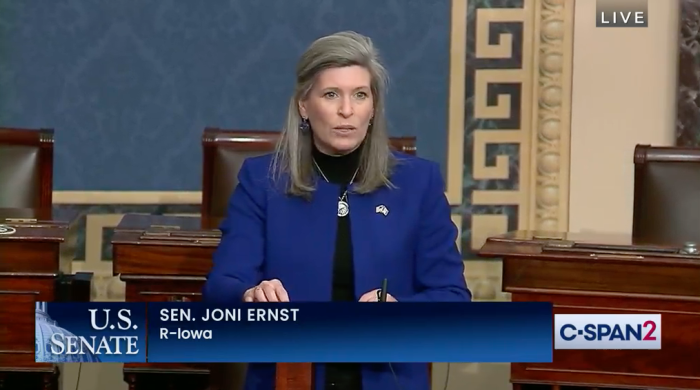Never underestimate the value of capable Congressional staffers, or of senators who can spot an opportunity.
The U.S. Senate voted on dozens of amendments during a marathon session starting on February 4 before passing the fiscal year 2021 budget resolution at 5:23 am the next day.
The “vote-a-rama” is “the price the majority party pays to approve a budget resolution,” Jennifer Scholtes and Caitlin Emma explained in Politico. The budget reconciliation process allows the Senate majority to move an important bill, like the next COVID-19 relief package, with only 51 votes, rather than the 60 votes needed to overcome a filibuster. On the other hand, senators in the minority can use the unlimited amendment process “to set up inconvenient or embarrassing show votes that might come back to haunt members of the majority during a reelection campaign,” in Ed Kilgore’s words.
Iowa’s Senator Joni Ernst prepared for this battle and got one of the roll calls she wanted. All but two members of the Democratic caucus opposed her language on immigration law enforcement, prompting Ernst to declare in a news release, “Majority of Democrats Side With Violent Illegal Criminals.”
However, she failed to force Democrats into a corner over what her staff called “blocking a drastic federal minimum wage hike during a pandemic.”
Raising the federal minimum wage to $15 per hour is a key goal for many Congressional Democrats, and President Joe Biden has endorsed including such language in the budget reconciliation bill.
Consequently, Ernst sponsored an amendment on “prohibiting an increase in the Federal minimum wage during a global pandemic to $15 per hour.”
Her amendment came up a little after 10:30 pm on February 4. I pulled this video from C-SPAN’s coverage of the 19-hour debate.
Introducing her amendment, Ernst said such a wage increase would be “devastating” for small businesses when they can least afford it. Citing the nonpartisan Congressional Budget Office, she asserted that 1.3 million jobs would be lost if the minimum wage were raised to $15.
“The cost of living in states like Iowa is very different from the cost of living in states like New York or California. We should not have a one-size-fits-all policy set by Washington politicians. We all support higher wages, but a $15 federal minimum wage would be counterproductive to this goal,” Ernst added.
Side note: Ernst co-sponsored a bill this week that “would prohibit federal funding to schools that do not provide an in-person learning option by April 30, 2021.” Sounds like a one-size-fits-all policy set by Washington politicians to me.
Returning to the matter at hand: Democratic Senator Bernie Sanders of Vermont rose to speak on Ernst’s amendment. He observed that millions of Americans are earning “starvation wages” or living from paycheck to paycheck, and Congress has not increased the federal minimum wage since 2007. He vowed to do everything he can to include a $15 minimum wage as part of the budget reconciliation bill, adding,
But there appears to be some misunderstanding. As the author of the Raise the Wage Act, it was never my intention to increase the minimum wage to $15 an hour immediately and during the pandemic. My legislation gradually increases the minimum wage to 15 dollars an hour over a five-year period.
Sanders called for adding minimum wage language to the budget reconciliation bill, but said he supports Ernst’s amendment, “because nobody is talking about doubling the federal minimum wage during the pandemic.”
In response, Ernst asked to speak again, but was told that her time had expired. She then took the unusual step of withdrawing her request for a roll call vote on her amendment. Senators approved the language by voice vote. Bloomberg News reporter Steven Dennis described the episode as “high drama.”
Although Ernst tried to spin the unanimous passage of her amendment as a victory, Dennis noted, “Bernie just defused what could have been an awkward, party-splitting roll call vote because Ernst’s amendment was worded in such a way that Bernie could literally agree with it!”
With better staff work or a keener eye for detail, Ernst could have made sure her amendment covered legislation to raise the wage to $15 an hour at any time, not just “during a global pandemic.”
P.S.- Although House and Senate Democrats have taken initial steps toward moving a COVID-19 package through budget reconciliation, they haven’t established the final contours of the legislation. Senate rules or moderates in the Democratic caucus may prevent the minimum wage language from being included.


2 Comments
This story is truly funny...
…and that makes it especially welcome. Thank you!
PrairieFan Sat 6 Feb 8:30 PM
Amateur hour
Ernst is tying to legislate by press conference talking point. There has been so much loose talk about the minimum wage that many workers also probably expect it to jump all the way to $15 if the bill passes.
iowavoter Tue 9 Feb 7:21 AM